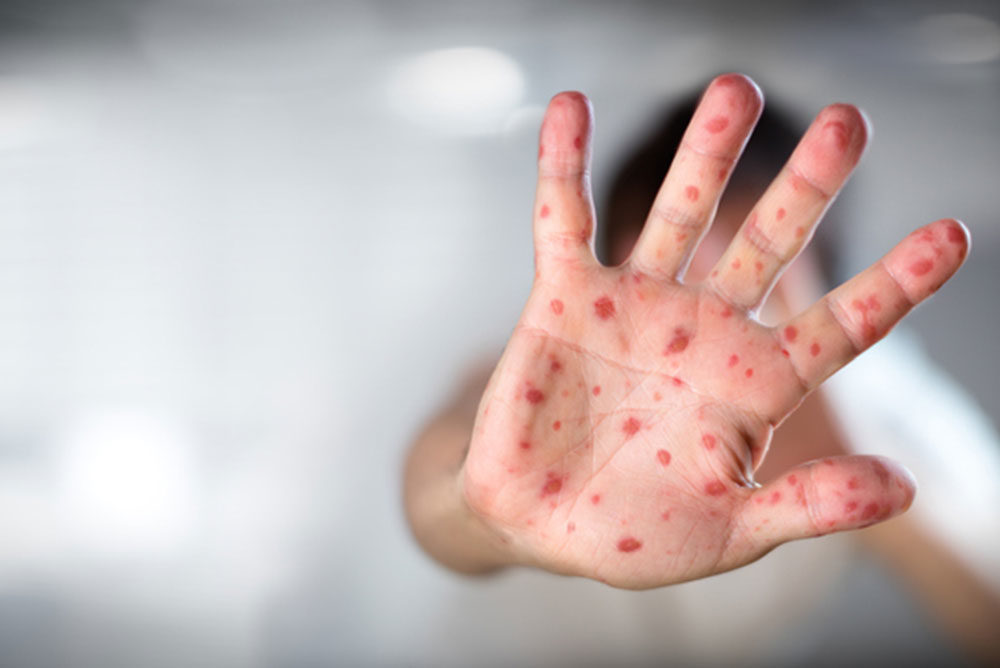
iStock
AFTER TRAVELING to Africa every few year for decades, filmmmaker K.R.R. had to add the measles vaccine to her medical to-do list for this summer’s visit. That’s because of the recent global surge in measles cases and because she was born in 1957 (considered the cut-off year for having acquired immunity).
In the U.S., people are asking these questions: how dangerous is the disease, and who needs the vaccine? The numbers of measles cases here continue to climb with every passing week—from more than 700 during April to more than 800 so far for May—but still much lower than the more than 17,000 cases in the outbreak of 1989.
For those born before 1957, the risk of contracting measles—and any serious risks—are very low due to immunity from frequent outbreaks that occurred during the 1950s. Those born during or after 1957 who cannot document having had measles or being vaccinated with live (vs. killed) virus should receive at least one dose of the vaccine.
But CDC Vaccine Director Nancy Messonnier recommends that all adults who travel internationally, those living in communities with ongoing outbreaks and those spending time in high-risk settings like hospitals check their status to make sure they’re protected.
The possibility of measles causing serious illness after early childhood is also very low. But for infants and children younger than five years old who get measles, almost one-third require hospital treatment. Hearing loss occurs in about one in ten due to ear infections, and one in 1,000 due to encephalitis (swelling of the brain).
About one of every 20 children who get measles will contract pneumonia, the most common cause of death. Between 1987 and 2000, for every 1,000 reported cases, two to three died from pneumonia and there was one case of encephalitis, which can also cause convulsions and intellectual disabilities.
The current outbreak has been traced to the rising numbers of unvaccinated children and the resulting decrease in herd immunity —”that cushion of immunity that helps all of us,” explains Messonnier.
Because a few people in every population—usually due to poor health—cannot receive vaccinations, the percentage that needs to be vaccinated to protect the entire population is based on each disease’s ease of transmission. For highly contagious measles, that number is around 95%, compared to 80-85% for polio.
The measles virus spreads via droplets that remain alive in the air for up to two hours after an infected person coughs or sneezes. Symptoms don’t show up until 10 to 14 days after exposure, and a person is contagious for four days both before and after the rash appears.
The outbreaks have been concentrated in four states: New York, New Jersey, Washington and California. Of those, the majority of cases (at a recent count, almost 500 out of little more than 700) have occurred in Orthodox Jewish communities in New York City and Rockland County, north of Manhattan, mostly because of parents who choose not to vaccinate their children. Locally, for 2019, Maryland has counted five cases; and DC and Virginia, none.
But responsibility also goes to the global surge in measles cases. These are up more than 300% in the first quarter of 2019 compared to the same period in 2018—a rise that the WHO considers “alarming” and “a global crisis”—with flare-ups occurring in France, Greece, Israel and India.
“When we see large measles outbreaks in countries that are common destinations for U.S. travelers like we’re seeing this year,” says CDC senior measles analyst James Goodson, “that’s when we often see the largest number of measles cases in the U.S.”
For adults, the main reason to get checked or vaccinated for measles is not to infect very young children or grandchildren. Measles is on the list of top five vaccines to get if you’re around young children. The others are influenza; pertussis, or whooping cough (Tdap vaccine includes a tetanus booster); pneumococcus (against the bacteria that cause pneumonia); and shingles (to prevent risk of spreading chickenpox, caused by the same virus as shingles.)
—Mary Carpenter
Every Tuesday in this space, well-being editor Mary Carpenter reports on health news you can use.

Although I was born in 1952, and remember having several types of measles, since we have young grandchildren I think I’m going to get tested to make sure I won’t be a carrier. This is a real worry.